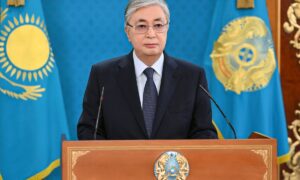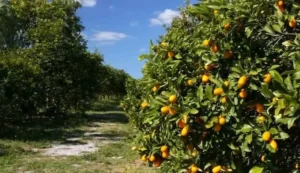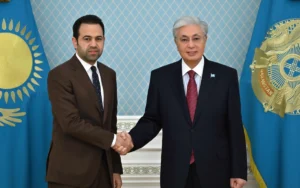President Tokayev Addresses Kazakhstan-Germany Business Forum in Astana

Astana, The Gulf Observer: On 16 September 2024, President Kassym-Jomart Tokayev addressed the Kazakhstan-Germany Business Forum in the capital, Astana, expressing gratitude to German Chancellor Olaf Scholz and prominent German business representatives for their participation. Tokayev hailed the Chancellor’s official visit as a milestone in Kazakh-German relations, providing new opportunities for enhanced cooperation.
In his speech, President Tokayev emphasized the close diplomatic relations between Kazakhstan and Germany, which serve as a foundation for broad economic ties. He noted that Germany, as one of the world’s most developed economies, sets global standards in manufacturing, technology, green economy, and innovation, with German products renowned for their quality.
Highlighting recent economic progress, Tokayev announced that bilateral trade between Kazakhstan and Germany surged by 41% in 2023, reaching $3.9 billion. Direct German investments also saw a remarkable increase of 64%, totaling $770 million—a record figure. Agreements have been reached on 66 joint investment projects valued at $55 billion, and Tokayev expressed optimism about further expanding German enterprises’ presence in Kazakhstan under the brand “Made in Kazakhstan with German quality.”
Kazakhstan, according to Tokayev, is pursuing a new economic paradigm centered on knowledge and innovation. He outlined significant reforms aimed at liberalizing the economy, promoting fair competition, and attracting $150 billion in foreign investments by 2029. Tokayev identified several promising areas of cooperation, including the extraction and processing of natural resources. He noted Kazakhstan’s vast mineral resource base, with over five thousand undiscovered deposits, and highlighted the importance of the German Mineral Resources Agency’s (DERA) partnership with Kazakhstani entities to establish a raw materials consortium. He also welcomed HMS Bergbau’s plans to invest $500 million in a lithium processing plant in East Kazakhstan.
Energy cooperation was also a key focus, with Tokayev emphasizing Kazakhstan’s position as a major oil exporter, particularly to European markets. He invited German companies to localize production of oil and gas equipment in Kazakhstan and underscored the potential of renewable energy cooperation, citing Germany’s Svevind Group’s $50 billion investment in producing green hydrogen for export to Europe.
Kazakhstan’s strategic location as a trade and logistics hub was another topic in Tokayev’s speech. He highlighted the Middle Corridor, the shortest and most reliable trade route between Europe and Asia, and proposed linking it with the Trans-European Transport Network and the EU’s Global Gateway initiative to accommodate growing East-West trade.
The President also pointed to opportunities for collaboration in the pharmaceutical sector, with Kazakhstan aiming to increase domestic production to cover 50% of its needs by 2025. Additionally, he highlighted Kazakhstan’s ambitions to become a leading IT hub in Eurasia, noting the country’s inclusion in the UN’s top 30 countries for digitalization and calling for further cooperation in AI research, startups, and technical education.
In closing, Tokayev encouraged German companies to explore new opportunities within the Astana International Financial Center (AIFC), a regional hub for investment, innovation, and financial services, modeled after leading financial centers like Frankfurt and London. The AIFC currently hosts 3,000 companies from 80 countries, including 20 German firms, with hopes of increasing this number in the near future.
President Tokayev expressed confidence that the Kazakhstan-Germany Business Forum would lead to significant outcomes and further deepen the economic ties between the two nations.


